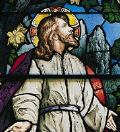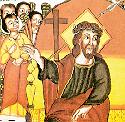Jesus as Mystic / Spirit Person
Jesus’ relationship to the Spirit of God was the central reality in his life, the source of all that he was.
~ Marcus Borg
Stories in the synoptic gospels of Matthew, Mark, and Luke all portray Jesus as a Spirit-filled person through whom the power of the Spirit flowed.
Baptism: seeing the spirit
 Mark
reports “And just as he was coming up out of
the water, he saw the heavens torn apart and the Spirit descending
like a dove on him.” (Mark 1:10, NRSV)
Mark
reports “And just as he was coming up out of
the water, he saw the heavens torn apart and the Spirit descending
like a dove on him.” (Mark 1:10, NRSV)
Temptations and visions
Matthew, Mark, and Luke all report that Jesus journeyed into the wilderness, underwent a period of extended solitude and fasting, and had visions.
Luke begins his account saying, “Jesus, full of the Holy Spirit, returned from the the Jordan and was led by the Spirit in the wilderness.” (Luke 4:1, NRSV. See also Mark 1:12-13; Mat. 4:1-11; Luke 4:1-13.)
Prayer: becoming present to the sacred
 Luke
emphasizes the role of prayer in Jesus’ life, saying Jesus entered
into times of deep contemplative / meditative prayer, often going into
the hills to pray or praying all night (Luke
3:21, 5:16, 6:12, 9:18, 9:28-29).
Luke
emphasizes the role of prayer in Jesus’ life, saying Jesus entered
into times of deep contemplative / meditative prayer, often going into
the hills to pray or praying all night (Luke
3:21, 5:16, 6:12, 9:18, 9:28-29).
These long hours of prayer in solitude in which the mind is stilled and the heart is directed toward God, was part of the Jewish tradition in which Jesus lived.
For example, Moses and Elijah in ancient Israel, and Hanina ben Dosa and Honi the Circle-Drawer, contemporaries of Jesus, practiced this classic discipline for becoming present to the sacred.
Significant impression made on others
There is something about people who are in touch with the sacred that can be felt by those around them; it evokes awe and amazement and impresses people with the feeling of another world.
Such was true of Jesus: “They were on the road, going up to Jerusalem, and Jesus was walking ahead of them; they were amazed, and those who followed were afraid” (Mark 10:32, NRSV).
He spoke with authority
 “They
were astounded at his teaching, for he taught them as one having
authority, and not as the scribes” (Mark
1:22, NRSV).
“They
were astounded at his teaching, for he taught them as one having
authority, and not as the scribes” (Mark
1:22, NRSV).
Conclusion
The cumulative impression created by the stories in Matthew, Mark, and Luke is that Jesus stands in the Jewish tradition of spirit persons.
Jesus is portrayed as a person through whom the power of the Spirit flowed.
For Jesus, God was an experiential reality, not simply an element of belief.
Questions to ponder...
What are the implications of taking Jesus seriously as a spirit person, in touch with the spirit of God?
Would it affect:
- how you see God / the sacred?
- your sense of what is possible and what is real?
- how you see the relationship between God and Jesus?
- how you see your relationship with God?
The evidence that Jesus was a healer is found in the earliest layer of the gospel traditions.
